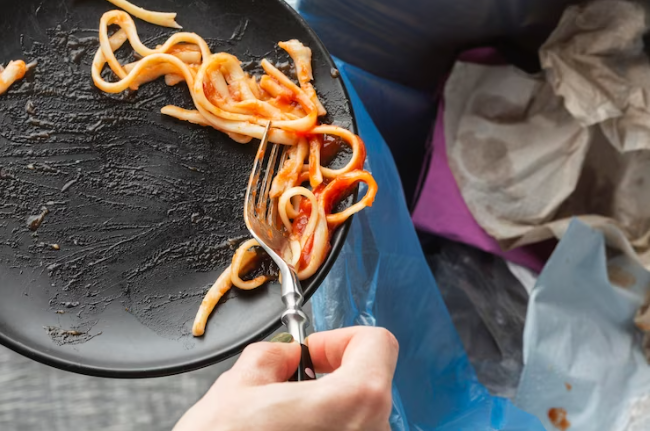Are you tired of throwing away perfectly good food at the end of each day in your restaurant? Not only is it a waste of money, but it also has a negative impact on the environment. That’s why managing food waste in your restaurant is crucial for both financial and ecological reasons.
By tracking your food waste, you can identify areas where you can reduce waste and save money. There are also strategies you can implement to reduce food waste, such as proper portion control and inventory management.
Additionally, donating excess food to local charities and food banks or implementing composting and recycling programs can further reduce waste and benefit your community.
In this article, we will explore the various ways you can manage food waste in your restaurant and the benefits it can bring.

The Importance of Tracking Food Waste
Tracking food waste is crucial in managing a restaurant’s environmental impact and financial sustainability. It not only allows you to measure your impact on the environment, but it also provides you with valuable data for analysis. By tracking food waste, you can identify patterns and areas of improvement, which can ultimately save you money and reduce your carbon footprint.
Measuring your food waste is the first step towards reducing it. By recording how much food is being thrown away on a regular basis, you can identify which dishes aren’t selling well, which ingredients are being overstocked, and which portions are too large. This data can then be used to make informed decisions about menu planning, inventory management, and portion control. All of these can lead to significant cost savings and a more sustainable restaurant operation.
So, if you haven’t already, start tracking your food waste today. This will improve your restaurant’s bottom line and reduce its impact on the environment.
Strategies for Reducing Food Waste in Your Restaurant
By implementing these simple tactics, you can easily cut down on excess food and save money in the process.
One strategy for reducing food waste in your restaurant is menu optimization. This involves assessing your menu and identifying dishes that are frequently left uneaten or have a high waste rate. By removing these items or modifying them to be more appealing to customers, you can reduce the amount of food that goes to waste.
Another effective tactic is portion control. By training your staff to serve appropriate portion sizes, you can ensure that customers are getting enough to eat without over-serving and creating excess waste. Additionally, you can offer smaller portion options for certain dishes or encourage customers to share larger plates.
By implementing these strategies, not only will you be reducing food waste, but you’ll also be saving money on food costs.
Donating Excess Food to Local Charities and Food Banks
Donating excess food to local charities and food banks can not only benefit those in need, but also create a positive impact for your community. By donating your excess food, you are helping to reduce food waste and support those who may not have access to nutritious meals. This is especially important as food insecurity continues to be a significant issue in many communities.
Additionally, donating food can have tax benefits for your restaurant. When you donate food, you may be eligible for tax deductions or credits, which can help offset the cost of your food waste. This can also help your restaurant save money and reduce its environmental impact.
Furthermore, by donating food, you are establishing your restaurant as a socially responsible business, which can improve your reputation and attract new customers. Overall, donating excess food to local charities and food banks is a win-win situation, as it not only helps those in need but also benefits your restaurant and community.
Composting and Recycling Programs
If you’re looking to reduce your environmental impact, consider implementing composting and recycling programs at your establishment.
Composting facilities can help divert food scraps and other organic waste from landfills, where they would otherwise emit harmful greenhouse gases. By using composting facilities, you can turn your food waste into nutrient-rich soil that can be used in gardens and farms. This is a great way to close the loop and reduce your waste output while also benefiting the environment.
In addition to composting facilities, there are other waste reduction techniques that you can implement at your restaurant. Recycling programs can help divert paper, plastic, and metal waste from landfills and give them a new life. By recycling, you can reduce the amount of waste your restaurant produces and help conserve natural resources.
By implementing composting and recycling programs, you can reduce your environmental impact, save money on waste disposal fees, and show your customers that you’re committed to sustainability.
Benefits of Managing Food Waste for Your Restaurant and the Environment
You’ll be amazed at the positive impact on both your bottom line and the planet when you take the simple step of implementing proper waste reduction measures. According to food waste statistics, the United States generates nearly 80 billion pounds of food waste each year. This means that roughly one-third of all food produced in the country ends up in landfills.
By managing food waste in your restaurant, you can significantly reduce the amount of waste you generate and save money on disposal costs. In addition to the financial benefits, managing food waste is also good for the environment.
Food waste awareness campaigns have helped to raise awareness about the negative impact of food waste on the planet. When food waste is sent to landfills, it decomposes and produces methane, a potent greenhouse gas that contributes to climate change. By reducing your restaurant’s food waste, you can help to reduce greenhouse gas emissions and do your part to protect the environment.
New article: Restaurant Sustainability, Going Green For Success. Link
Frequently Asked Questions
How can food waste be tracked and measured accurately in a restaurant?
To accurately track and measure food waste, you can use methods such as weighing and categorizing waste by type. This allows you to identify areas for improvement and reduce costs. Accurate measurement also helps with sustainability efforts.
Are there any legal regulations for food waste management in restaurants?
You need to be aware of the legal implications and industry standards for food waste management in your restaurant. Failure to comply can result in fines and damage to your reputation.
How can staff be trained and incentivized to reduce food waste in a restaurant?
Train staff to reduce food waste by implementing incentive programs like rewarding those who suggest ways to reduce waste or participate in composting. Provide ongoing education on proper portioning and storage techniques.
What are some creative ways to repurpose food scraps or excess ingredients in a restaurant?
Get creative with recipes and sustainability initiatives to repurpose food scraps and excess ingredients. Try making soups, stocks, and sauces from vegetable scraps, or using leftover bread for croutons or breadcrumbs.
How can a restaurant effectively communicate their food waste reduction efforts to customers and the community?
To effectively communicate your food waste reduction efforts, use social media campaigns to showcase your sustainable practices. Encourage customer feedback and highlight your commitment to reducing waste.
Conclusion
Congratulations! You’ve learned some effective strategies for managing food waste in your restaurant. By tracking your waste, you can identify areas where you can improve and reduce your environmental impact.
Donating excess food and participating in composting and recycling programs are great ways to reduce waste and give back to your community. Implementing these strategies not only benefits the environment and those in need, but it can also save your restaurant money in the long run.
So, take action and start implementing these strategies today to reduce your food waste and contribute to a more sustainable future. Your efforts will make a big difference!



